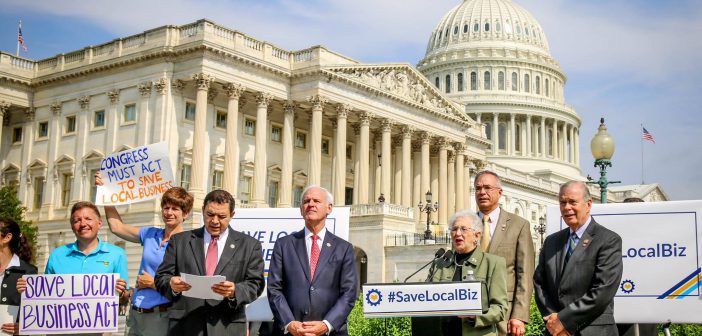Hopes are up for a bipartisan solution to snake its way through Congress and onto the president’s desk.
by BRANDON VERVELDE
On a sunny, steamy day in July, just a few yards from the Capitol, lawmakers stood shoulder to shoulder to announce the bipartisan authorship of a bill to roll back the expansion of the joint employer standard. As the harsh summer sun shone on their faces, lawmakers took turns at the podium to tell those gathered – reporters, mostly, but also business owners, lobbyists, congressional staffers and interns – why they had come to support the bill.

Lawmakers were joined by small business owners and citizens at the press conference in support of the Save Local Business Act.
The bill’s principal author, Rep. Bradley Byrne, said it would provide much-needed stability and clarification to businesses and employees alike.
“Federal labor policies should be focused on benefiting workers and helping small businesses grow instead of creating barriers that limit opportunity,” said Byrne, an Alabama Republican well known by AAHOA members. “Under this legislation, workers and the businesses they work for will be given much needed clarity and certainty.”
Rep. Virginia Foxx, a North Carolina Republican who chairs the House’s labor committee, said Congress needs to act.
“Congress cannot sit on the sidelines while this harmful scheme threatens to destroy jobs and make it harder for entrepreneurs to achieve the American Dream of owning a business,” Foxx said.
Rep. Henry Cuellar, a Texas Democrat, spoke of the inequity of the expanded joint employment standard.
“We must ensure that our small businesses and franchises receive fair treatment from the government,” Cuellar said. “I have heard from small business owners throughout my district and the country, and it is clear that the joint employer decision is a major threat to the life of the franchise industry and the dream of business ownership for millions of Americans.”
Rep. Lou Correa, a freshman Democrat from Anaheim, Calif., could not be at the announcement in person, but he issued a statement saying the expanded joint employer standard threatens small businesses.
“All across our country, small businesses enrich communities and employ the bulk of Americans,” Correa said. “We must do everything we can to support small business entrepreneurs.”
The bipartisan gaggle of lawmakers were themselves flanked by small business owners and concerned citizens holding handmade signs in support of the bill, titled the Save Local Business Act.

Burger King franchisee Ed Brady from Baltimore addresses reporters about the need for clarity on the joint employer issue, which is a threat to small franchisees like him.
Ed Brady was one of the small business owners invited to speak at the press conference. Small franchisees are an “endangered species,” he said, due to the threat of joint employer lawsuits under the new standard. Brady owns a Burger King franchise in Baltimore.
“Small businesses like mine need certainty to expand. The larger franchisors now see me as a risk because I’m a small franchisee, and I don’t have the resources to fight off lawsuits,” Brady said.
BIPARTISAN SUPPORT BUILDING
The two Democratic cosponsors of the Save Local Business Act are not the only congressional Democrats to express concerns about the joint employer issue.
In May, a group of 13 Democrats, including Cuellar and Correa, sent a letter to the National Labor Relations Board (NLRB) asking for clarification of the conflicting messages the board has sent on the joint employer standard.
The NLRB is an unelected federal panel tasked with refereeing disputes between labor and management. In 2015, it issued an informal memorandum concluding that frozen yogurt purveyor Freshii was not a joint employer with its franchisees. They relied in part on the long-standing joint employer standard to come to that conclusion.
Just four months later, however, the board radically changed course in a formal decision involving the waste management company Browning-Ferris Industries. The board expanded the joint employer standard to include a slew of new factors in deciding against the company. This action is the “joint employer decision” cited by lawmakers when talking about the issue.
In their letter, the Democratic lawmakers asked which case should be leaned on by businesses and workers across the country to better understand their legal responsibilities: the Freshii case or the Browning-Ferris case?
NLRB General Counsel Richard Griffin refused to clarify the issue for the lawmakers when he responded on behalf of the board. He is not officially a member of the board but has significant power over its operations and decisions.
“The [Freshii] memorandum speaks for itself,” he wrote back to the lawmakers. “Of course, [the memo]should be read in light of subsequent developments, including the board’s decision” in the Browning-Ferris case.
Michael Layman, executive director of the Coalition to Save Local Businesses (of which AAHOA is a member), called Griffin’s response “dismissive and unsatisfying,” according to a Bloomberg BNA news article.
“The joint employment uncertainty created by the NLRB is reaching all levels of business, including small franchise employers, construction companies, service providers and all their business partners, and it will continue to harm businesses until Congress enacts a permanent legislative solution,” said Layman.
Foxx told Today’s Hotelier that the growing calls for a fix from members’ districts played a big role in the issue earning bipartisan support.
“When members of Congress hear from constituents about a decision Washington has made that has had a negative impact on their livelihoods and their local economies, we listen,” Foxx said. “This bill directly addresses [NLRB’s] mistake and brings back the commonsense definition of what it means to be a joint employer. That’s reason enough for members of Congress from both parties to support it, and that’s why the number of cosponsors has continued to grow.”
Not all Democrats are on board however. Rep. Bobby Scott, the highest ranking Democrat on the House labor committee, issued a statement against the bill, calling it the “bill to undermine workers’ rights.”
“Workers who seek to hold their employers accountable for violating wage and hour laws or refusing to collectively bargain will lose under this bill,” said Scott, who represents Norfolk and Newport News, Va. “This bill strips workers of their legal rights to secure the wages they have earned or to bargain for a better life.”
THE BILL’S PROSPECT IN THE SENATE UNCERTAIN
“We are dead serious about not just passing it through the House, but getting it over to the Senate and getting 60 votes to pass it on the floor of the Senate and send it to the president,” said Byrne at the press conference. “And we know he will sign it.”
The bill’s bipartisan support does indicate it has potential to become law, but it will need much more support if it is to pass through the Senate. As Byrne alluded to, the Senate’s filibuster rule requires 60 votes to even debate a bill, let alone take a vote on it. In that chamber, Republicans hold 52 seats and Democrats hold 48, meaning a minimum of eight Democrats are needed to overcome the filibuster.
As of this magazine’s deadline, the bill did not have a single senator to author or sponsor the bill in that chamber. That does not mean the bill cannot pass the Senate, as they technically could just pass the House bill once it reaches their chamber. However, having the Senate work simultaneously on an identical Senate version of the bill will save time in the legislative process and is an obvious indication that the bill has support.
Foxx told Today’s Hotelier that talks are ongoing with senators to author and introduce the measure in the Senate, but she urged people to contact their senators’ offices about it.
“I encourage people to reach out to the senators from their home states and remind them that local businesses need to have clarity and certainty again,” she said. ■

Join us in D.C.
AAHOA’s Fall National Advocacy Conference is taking place October 24–25 in Washington, D.C. For more information or to register, visit AAHOA.com.
How to contact your senators
You need to take action if this bill is going to be successful. Right now, the bill does not have any Senate authors or sponsors. Rep Virginia Foxx, R-N.C., says that talks are ongoing with senators to support the bill, but the senators need to hear from their constituents.
“I encourage people to reach out to the senators from their home states and remind them that local businesses need to have clarity and certainty again,” said Foxx.
It’s time for the hospitality industry to take action. Go to aahoa.freeenterpriseaction.com/act to use AAHOA’s Action Alert portal to send an email to your senator. All you need to do is fill in your name and address, and our system will send a pre-written email to your individual senators with your name signed to it.
This issue has never had this much momentum behind it. With your help, we can get this important bill across the finish line and to President Donald Trump’s desk. Please take action today!
Contacting your elected officials takes just minutes with AAHOA’s Action Center. Go to aahoa.freeenterpriseaction.cpm/act to take action now.
Brandon VerVelde is director of Government Affairs Communication for AAHOA and can be reached at [email protected].




